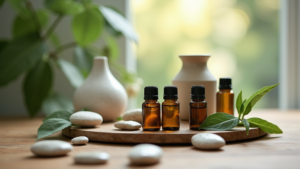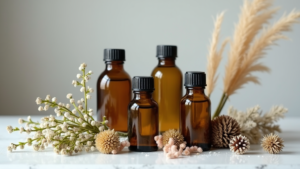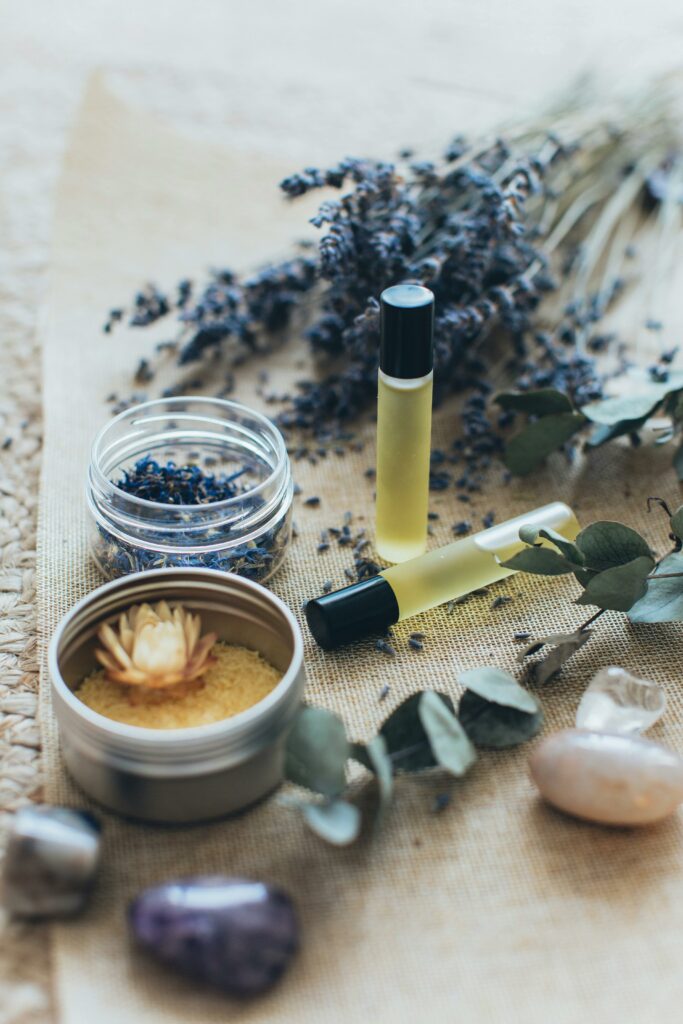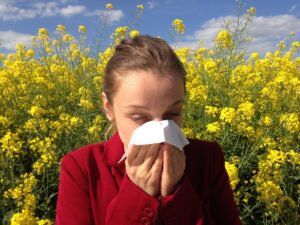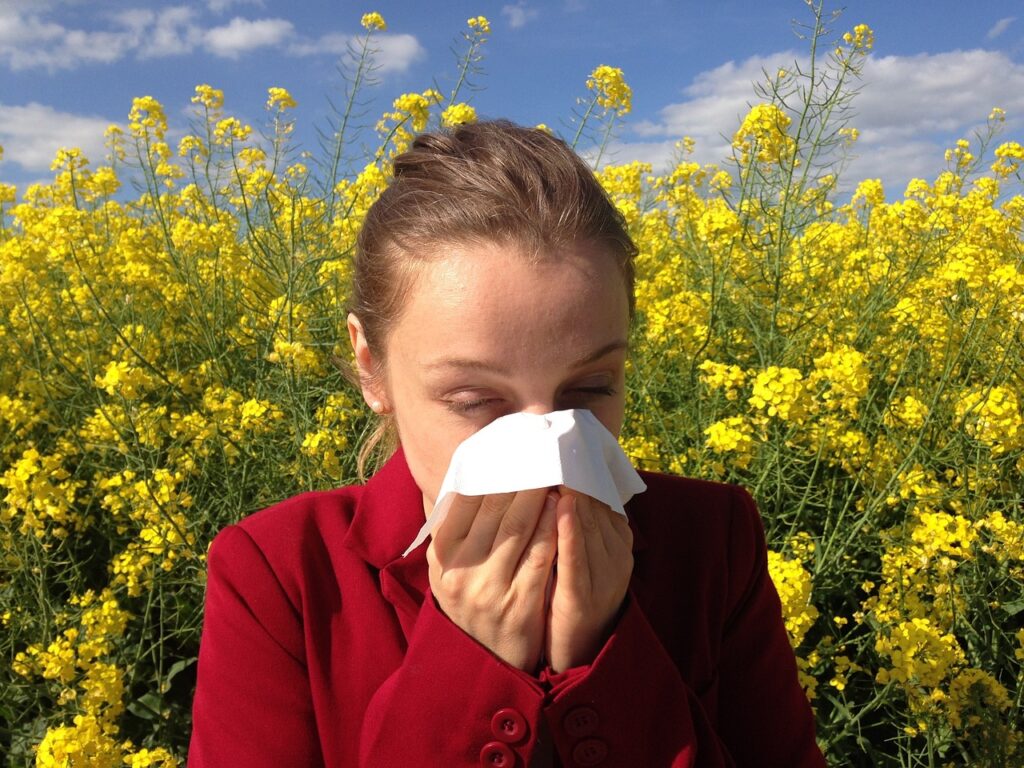
Allergies affect millions of people worldwide, causing discomfort and disrupting daily life. Symptoms such as sneezing, runny noses, itchy eyes, skin rashes, or even breathing difficulties are common complaints during allergy season or in response to certain triggers. While medications like antihistamines and decongestants are commonly used, many people seek natural alternatives to help alleviate their symptoms. Essential oils, extracted from plants and renowned for their therapeutic benefits, offer a natural way to manage allergies. In this detailed guide, we’ll explore the best essential oils for allergy relief, their uses, and safety precautions to ensure their effectiveness.
How Essential Oils Help Alleviate Allergies
Essential oils are concentrated plant extracts that contain powerful aromatic compounds. They can provide relief from allergy symptoms by targeting the root causes, such as inflammation, immune overreactions, and respiratory congestion. Here’s how essential oils work for allergies:
- Anti-inflammatory properties: Many essential oils reduce inflammation in the respiratory system and skin, helping to calm allergic reactions.
- Antihistamine effects: Some oils naturally inhibit the release of histamines, the chemicals responsible for allergy symptoms.
- Immune system support: Essential oils can help balance the immune system, reducing its overreaction to allergens.
- Respiratory benefits: Decongestant and expectorant properties in certain oils clear mucus and improve airflow.
- Skin soothing effects: Oils with calming properties can reduce itching and redness caused by allergic rashes.
Essential oils can be used in several ways: through inhalation, topical application, or diffusion. However, they must be used with caution. Their concentrated nature requires proper dilution and testing to avoid skin irritation or adverse reactions.
Top Essential Oils for Allergy Relief
1. Lavender (Lavandula angustifolia)
Lavender is one of the most versatile essential oils and a popular choice for allergy relief. Known for its calming and soothing properties, it is especially effective at reducing inflammation and alleviating respiratory discomfort. Lavender also acts as a natural antihistamine, making it ideal for managing allergic reactions.
- Therapeutic properties: Anti-inflammatory, sedative, calming.
- Common uses:
- Inhaling lavender oil helps reduce nasal congestion and irritation.
- Diluted lavender oil can be applied to itchy skin or rashes to soothe inflammation.
- How to use:
- Add 4–5 drops to a diffuser and inhale the calming aroma.
- Mix 2–3 drops with a tablespoon of coconut oil and gently massage it onto affected skin.
Lavender also promotes relaxation, which can help manage stress, a common trigger for allergy flare-ups.
2. Peppermint (Mentha piperita)
Peppermint oil is a powerhouse for clearing respiratory pathways and alleviating sinus congestion. Its cooling effect soothes irritation in the throat and nasal passages, providing immediate relief for allergy symptoms.
- Therapeutic properties: Decongestant, anti-inflammatory, cooling, and invigorating.
- Common uses:
- Helps open airways and reduce nasal congestion.
- Soothes sore throats caused by postnasal drip.
- How to use:
- Add 3–4 drops to a bowl of steaming water, cover your head with a towel, and inhale deeply for 5–10 minutes.
- Mix 2 drops with a carrier oil, such as almond oil, and rub onto your chest or temples for relief from sinus pressure.
Peppermint oil is highly potent and should be used sparingly. It’s not recommended for use around young children.
3. Eucalyptus (Eucalyptus globulus)
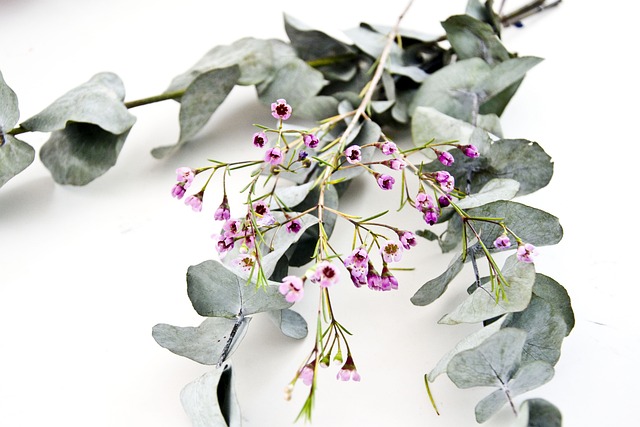
Eucalyptus oil is widely known for its ability to relieve respiratory congestion. It contains a compound called eucalyptol, which acts as an effective decongestant and anti-inflammatory agent. It also has antimicrobial properties, making it beneficial for allergies caused by airborne irritants like mold.
- Therapeutic properties: Decongestant, anti-inflammatory, antimicrobial.
- Common uses:
- Clears mucus and relieves sinus pressure.
- Helps disinfect the air in your home to reduce allergens.
- How to use:
- Add 4–5 drops to a diffuser to purify the air and reduce respiratory symptoms.
- Blend 2 drops with a carrier oil and massage onto your chest or throat to promote easier breathing.
It’s important to note that eucalyptus oil should not be used near infants or young children, as it can cause breathing issues.
4. Tea Tree (Melaleuca alternifolia)
Tea tree oil is a powerful antimicrobial agent that can help fight allergens such as mold spores, dust mites, and pet dander. Additionally, it soothes itchy skin and can be used to manage allergy-related skin conditions.
- Therapeutic properties: Antimicrobial, antifungal, anti-inflammatory.
- Common uses:
- Reduces allergy symptoms caused by mold or airborne irritants.
- Relieves skin irritation or rashes caused by allergies.
- How to use:
- Add a few drops to your cleaning solutions to remove mold and reduce allergens in your home.
- Mix 2 drops with a carrier oil and apply to itchy or inflamed skin.
Tea tree oil can cause irritation in some individuals, so always perform a patch test before using it on your skin.
5. Roman Chamomile (Chamaemelum nobile)
Roman chamomile is a gentle and effective oil for calming inflammation and soothing allergic reactions. Its mild nature makes it safe for most individuals, including children.
- Therapeutic properties: Anti-inflammatory, calming, sedative.
- Common uses:
- Reduces inflammation in the respiratory tract.
- Soothes irritated or itchy skin.
- How to use:
- Diffuse 3–4 drops to create a relaxing environment and reduce respiratory irritation.
- Combine 2 drops with jojoba oil and apply to rashes or hives.
Roman chamomile’s calming properties also help manage stress, which can exacerbate allergies.
6. Lemon (Citrus limon)
Lemon essential oil is a natural detoxifier that supports the immune system and helps clear airborne allergens. Its fresh, uplifting aroma is an added bonus.
- Therapeutic properties: Detoxifying, energizing, antimicrobial.
- Common uses:
- Helps purify the air and reduce exposure to allergens.
- Boosts the immune system to combat allergy symptoms.
- How to use:
- Add 3–4 drops to a diffuser to freshen the air in your home.
- Mix 1–2 drops with a carrier oil and apply to your wrists or neck.
Lemon oil can make the skin more sensitive to sunlight, so avoid direct sun exposure after applying it.
7. Frankincense (Boswellia carterii)
Frankincense oil is known for its calming properties and ability to reduce inflammation. It supports respiratory health and strengthens the immune system, making it an excellent choice for allergy relief.
- Therapeutic properties: Anti-inflammatory, immune-boosting, grounding.
- Common uses:
- Eases nasal congestion and promotes relaxation.
- Balances the immune system to reduce allergic responses.
- How to use:
- Diffuse 3–4 drops during allergy season for sustained relief.
- Blend with a carrier oil and massage onto your temples or chest.
Frankincense is gentle and suitable for long-term use.
8. Basil (Ocimum basilicum)
Basil essential oil acts as a natural antihistamine and helps reduce the severity of allergic reactions. It also supports adrenal health, which can be affected by chronic allergies.
- Therapeutic properties: Antihistamine, anti-inflammatory, immune-modulating.
- Common uses:
- Relieves respiratory symptoms and nasal congestion.
- Enhances mental clarity and focus during allergy season.
- How to use:
- Add 3 drops to a diffuser or inhale directly from the bottle.
- Mix 2 drops with grapeseed oil and apply to your neck or pulse points.
Basil oil is particularly effective when combined with other oils like eucalyptus or peppermint.
Combining Essential Oils for Enhanced Relief
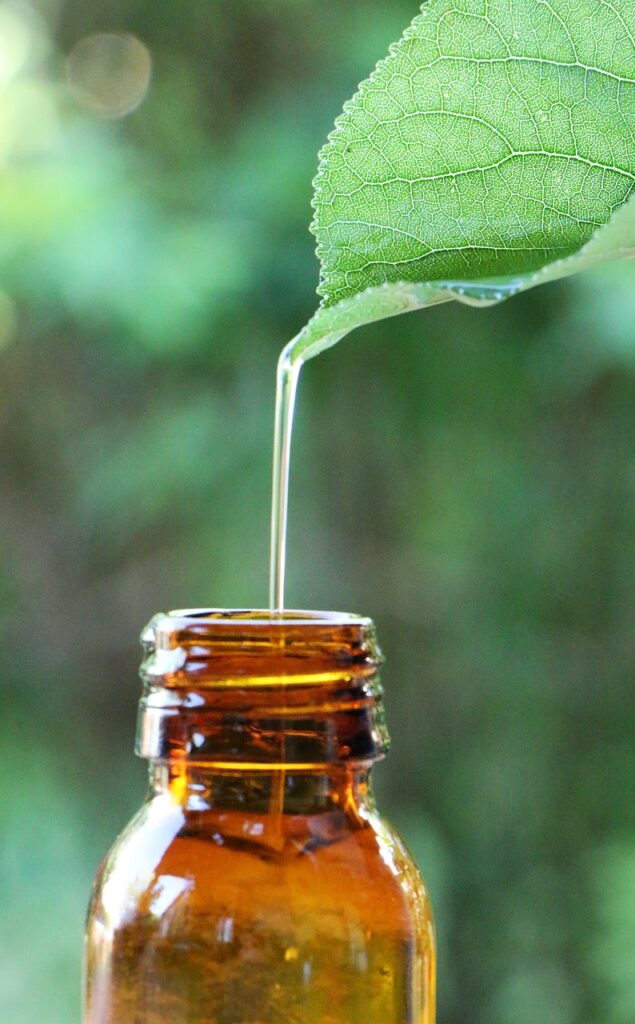
Blending essential oils allows you to target multiple symptoms at once. Here are a few tried-and-tested blends for allergies:
- Respiratory Relief Blend:
- 3 drops eucalyptus oil
- 2 drops peppermint oil
- 2 drops lemon oil
- Diffuse during allergy season or when nasal congestion is severe.
- Skin Soothing Blend:
- 4 drops lavender oil
- 3 drops Roman chamomile oil
- 1 tablespoon coconut oil
- Apply to areas of irritated skin for relief.
- Immune Boosting Blend:
- 3 drops frankincense oil
- 2 drops basil oil
- 3 drops tea tree oil
- Diffuse daily to strengthen your immune system.
Safety Tips for Using Essential Oils
Essential oils are potent and must be used responsibly. Follow these safety tips:
- Dilution: Always dilute essential oils with a carrier oil like coconut, jojoba, or almond oil before applying to the skin.
- Patch Test: Apply a small amount of diluted oil to your skin and wait 24 hours to check for any reaction.
- Dosage: Use no more than 3–5 drops per application. Overuse can lead to irritation or adverse effects.
- Avoid Sensitive Areas: Do not apply oils near your eyes, inside your nose, or on broken skin.
- Consult a Professional: If you’re pregnant, nursing, or have a medical condition, seek advice from a healthcare provider.
Lifestyle Tips to Complement Essential Oils
For best results, pair essential oils with other natural strategies to manage allergies:
- Keep Your Environment Clean: Regularly dust, vacuum, and wash bedding to reduce allergens.
- Invest in an Air Purifier: These devices help remove airborne allergens like pollen and pet dander.
- Maintain a Healthy Diet: Eat anti-inflammatory foods rich in antioxidants, such as fruits, vegetables, and omega-3 fatty acids.
- Stay Hydrated: Drinking water helps thin mucus and keeps your airways clear.
- Manage Stress: High stress levels can exacerbate allergies. Practices like yoga, meditation, and aromatherapy can help.
Conclusion
Essential oils offer a natural and effective way to manage allergy symptoms. With their anti-inflammatory, decongestant, and immune-boosting properties, oils like lavender, peppermint, eucalyptus, and tea tree provide targeted relief for common allergy complaints. However, they must be used with care to ensure safety and effectiveness. By incorporating essential oils into your allergy management routine and following healthy lifestyle habits, you can breathe easier and enjoy a better quality of life, even during peak allergy season.
Related Articles
“Mental Health Issues Magazine” to purchase click here
Mental Health Issues Magazine is your straight-talking guide to navigating the maze of modern mental health — without fluff, jargon, or pity. Written by someone who’s been there, this powerful collection of articles tackles everything from schizophrenia and anxiety to trauma, addiction, and gaslighting by the system. If you’re tired of sugar-coated wellness advice and want real-world insights from someone who has walked through the fire and lived to tell the tale, this is your companion on the road to understanding, resilience, and recovery.

